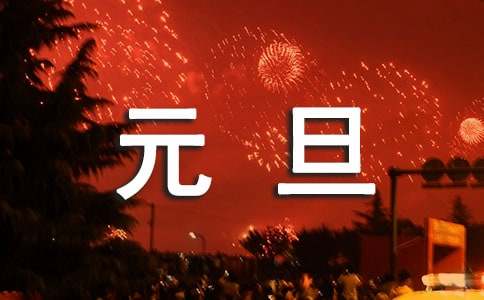元旦的由来(英语版)
导语:全世界绝大多数地方都会在这一天放假,举行各种各样的庆祝活动,最常见的就是各个国家的领导人发表新年致辞以及全世界的青年男女齐聚在一起,一起迎接新年钟声敲响。下面是小编精选的关于元旦的由来,欢迎参考!

关于元旦的由来
On New Years day in ancient China, it was not the Gregorian calendar. From the Yin dynasty, the first year of the twelfth lunar month is the first year of the lunar calendar, and the first lunar month is the first year of the lunar calendar. To the republic of China, sun yat-sen in nanjing in early January 1912 as the temporary President for "farming", "statistics", set the first lunar month as the Spring Festival, change to the Gregorian calendar on January 1, known as the "New Year", at but it is still called "New Years day". Until the liberation of the central peoples government issued a unified use of the "national year and day holidays", the Gregorian calendar January 1 as the New Years day, and decided the whole country to have a day off. At the same time, the lunar New Year and the Gregorian calendar are two new years, and the lunar New Year is the first day of the lunar New Year, which is called the "Spring Festival".
The "yuan" of "New Years day" means the beginning, the first meaning, the number of the beginning is called "yuan"; "Dan", hieroglyphs, the above "day" represents the sun, and below "one" represents the horizon. "Dan" means the sun rises slowly on the horizon, symbolizing the beginning of the day. People combine the words "yuan" and "Dan" to be extended into the first day of the New Year. New Years day is also called "three yuan", namely, the yuan of the year, the yuan of the month, the yuan. The first word of New Years day started from the third emperor wudi, and the words "the Book of Jin" written by tang fang xuanling and others have been uploaded on the New Years day. "the word" zhuandi "was made in the first month of mengchun, and the New Year was in the spring of New Years day. Namely, the first month is called the yuan, the first is Dan. The poem of "jie ya" by LAN ziyun of the south Korean liang is also yun: "four New Years day, a New Years day.
There is a legend, is over 4000 years ago the ancient rao war, yao right in diligent people do a lot of good things for the people, is popular with the masses of the people love, but because his son was not out, he didnt pass "son of heaven" the throne to his son, but rather to shun the character can have both. Yao said to shun, "you must pass on the throne to me in the future, and I will settle my eyes after my death." Later, shun passed the throne to yu, who was responsible for the flood, and yu, like shun, had done a lot of good deeds for the people and loved the people. After the death of the yao people later ShunDi sacrifice to heaven and earth and emperor yao first on that day, as the day of the beginning of the year, called the homonym for "New Years day", or "yuan", this is the ancient New Years day. All previous dynasties dynasty held on New Years day to celebrate the pomp and circumstance qi si and other activities, such as a sacrifice to gods and ancestors, couplets hanging door, writing everyone, WuLongDeng, folk also gradually formed the deities, pilgrimage, stick Spring Festival couplets, set off firecrackers, shou sui, eat family reunion dinner, and numerous celebrations "jan" and other entertainment. The jin dynasty poet xin LAN once had "yuan zheng" poem: "yuanzheng kai jie jie, jiqing zhaozi. Salty music is the beginning of the year, small and big yue xi." Describe the New Years celebration.
After the republic of China, while on January 1 as New Years day, there were only organs, schools, and foreign business of foreign firm big firms such as just 1 day vacation, people do not admit, delay still bear the ancient old habits to lunar month for the New Year, so the old Beijings streets and folk are no celebrations. Liberation will beginning January 1, renamed the "New Years day", the government still to use the lunar calendar for the thousands of years according to the season festive, DongXian spring begins in the period of the "Spring Festival" off for three days, folk "temple" and other festivities, inheriting the wishes of the people in one thousand and the folk custom.
翻译
古代中国的元旦日,并非如今通用的“格列历”——公历的'一月一日。从殷代定农历十二月初一为岁首,到汉代定在农历正月初一为岁首,曾有多次反反复复的改变。到民国时孙中山于1912年1月初在南京就任临时大总统时为“顺农时”、“便统计”,定农历正月初一为春节,改公历1月1日称为岁首“新年”,但仍称“元旦”。直到解放后中央人民政府颁布统一使用“全国年节和纪念日放假办法”,将公历1月1日规定为元旦节,并决定全国在此节放假一天。同时为区别农历和公历两个新年,又鉴于农历二十四个节气中的“立春”,恰在农历新年前后,因此改农历正月初一称为“春节”。
“元旦”的“元”,指开始,是第一的意思,凡数之始称为“元”;“旦”,象形字,上面的“日”代表太阳,下面的“一”代表地平线。“旦”即太阳从地平线上冉冉升起,象征一日的开始。人们把“元”和“旦”两个字结合起来,就引申为新年开始的第一天。元旦又称“三元”,即岁之元、月之元、时之元。元旦一词最早始于三皇五帝,唐房玄龄等人写的《晋书》上载:“颛帝以孟春正月为元,其时正朔元旦之春。”即把正月称为元,初一为旦。南朝梁人兰子云的《介雅》诗也云:“四气新元旦,万寿初今朝。”
还有个传说,是在4000多年前远古的尧舜盛世之时,尧天子在位时勤政于民为百姓办了很多好事,很受广大百姓爱戴,但因其子无才不太成器,他没把“天子”的皇位传给自己的儿子,而是传给了品德才能兼备的舜。尧对舜说:“你今后一定要把帝位传交好,待我死后也可安心瞑目了。”后来舜把帝位传给了治洪水有功的禹,禹亦像舜那样亲民爱民为百姓做了很多好事,都十分受人爱戴。后来人们把尧死后,舜帝祭祀天地和先帝尧的那一天,当作一年的开始之日,把正月初一称为“元旦”,或“元正”,这就是古代的元旦。历代皇朝都在元旦举行庆贺典仪祈祀等活动,如祭诸神祭先祖,写门对挂春联,书写福字、舞龙灯,民间也逐渐形成祭神佛、祭祖先、贴春联、放鞭炮、守岁、吃团圆饭以及众多的“社火”等娱乐欢庆活动。晋代诗人辛兰曾有《元正》诗:“元正启令节,嘉庆肇自兹。咸奏万年觞,小大同悦熙。”记述元旦庆贺情景。
在民国以后虽然定1月1日为新年,当时只有机关、学校以及外国经营的洋行大商号等才放假1天,老百姓并不承认,仍延承古时旧习以农历初一为新年,因此老北京的街市上与民间均没有什么欢庆活动。解放后将1月1日岁首改称为“元旦”节后,政府仍按照几千年来使用的农历历法按农时节令,在立春前后冬闲时期的“春节”放假三天,民间办“庙会”等欢庆,传承百姓的心愿和千百年的民俗。
【元旦的由来(英语版)】相关文章:
元旦的由来合集01-13
元旦由来的作文04-04
美国元旦的由来01-10
浅谈元旦的由来02-03
中国的元旦由来01-11
元旦的由来简短01-01
关于元旦的由来05-27
公历元旦的由来01-01
介绍元旦的由来01-11
